
The Red Cross has said that the new fire that broke out in the port of Beirut has destroyed food and fuel-aid that was meant to be distributed among the populace still reeling from the devastating port explosion that occurred just one month ago.
Shocking images from the port of Beirut. The warehouse on fire is where @ICRC_lb stocks thousands food parcels and 0.5 million L oil. The extent of the damage still remains to be established. Our humanitarian operation risks to be seriously disrupted.https://t.co/S6l6IA0bdz
— Fabrizio Carboni (@FCarboniICRC) September 10, 2020
The International Committee of the Red Cross said in a statement:
"The warehouse on fire is where ICRC stocks thousands (of) food parcels and 0.5 million litres of oil. The extent of the damage still remains to be established. Our humanitarian operation risks to be seriously disrupted."
The blaze took hold just 24 hours after 4 tonnes of ammonium nitrate was discovered at the port. It was this same chemical that exploded last month, leading to the deaths of 190 people and a huge swathe of Beirut being damaged. It is strongly suspected that the explosion occurred as the roughly 3 tonnes of ammonium nitrate was improperly stored. Experts say the explosion had roughly 10% of the power of the atomic bomb dropped on Hiroshima in 1945. Dozens of port officials have been placed under house arrest while a full investigation is carried out by the Lebanese authorities.
The latest fire is now under control according to authorities and it is estimated that no one was injured. While the building that caught fire was previously equipped with fire fighting devices, these were destroyed in last month's blast, thereby allowing the fire to get out of hand at an alarming rate.
As soon as the fire was noticed, thousands of Beirut residents began to flee, fearing that there was going to be a repeat of last month's catastrophe. Their fears were indeed heightened after the latest discovery of ammonium nitrate in the port. A smaller fire had also broken out on Tuesday but was swiftly brought under control.
Lebanon has been experiencing a huge economic downturn, even before the global pandemic and the port explosion, leading some to suspect that cuts to health and safety authorities may have been in part responsible for allowing the disaster to occur. The latest events will certainly see many Lebanese citizens questioning whether their government can still keep them safe.












COMMENTS